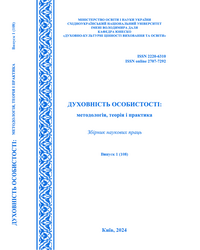VOCAL ART AS A TOOL CREATIVE SELF-EXPRESSION OF FUTURE TEACHERS OF MUSICAL ART IN THE EDUCATIONAL PROCESS OF HIGHER EDUCATION INSTITUTIONS
DOI:
https://doi.org/10.33216/2220-6310/2024-109-2-150-158Keywords:
vocal art, musical education, creative self-expression, future teachers of musical art, educational process, higher education institutionAbstract
The article highlights the possibilities of vocal training of future music teachers, which contribute to the formation of their creative self-expression. The process during which students, performing musical works, feel an emotional resonance with music, which allows them to perceive and understand musical works more deeply, bringing their own emotions into the process of creative self-expression, is considered. This approach contributes to the development of their aesthetic awareness and musical literacy.
The importance of such training is emphasized, which not only helps students master technical skills, but also achieve a deeper psychological and emotional insight into the content of musical works. Thanks to this, future music teachers can effectively transfer their knowledge and inspire students to a deeper understanding and appreciation of music.
Emphasis is placed on the pedagogical influence of vocal skills on the formation of creative self-expression of future music teachers. The concept of "vocal mastery of future teachers of musical art" is defined as an integrated new formation aimed at the successful performance of vocal-pedagogical activities.
The importance of vocal art as a tool of creative self-expression for future music teachers in higher educational institutions is studied. It is considered how vocal art affects a person's emotions, feelings and mood, contributing to the development of his creative abilities. Demands have been put forward to vocal teachers to optimize teaching methods and improve the quality of teaching. The necessity of combining the needs of society with the development of students' practical abilities to meet the social needs of talented performers is emphasized. The relevance of introducing new approaches to vocal teaching and improving the quality of professional training of future specialists in vocal music in higher educational institutions is highlighted.

